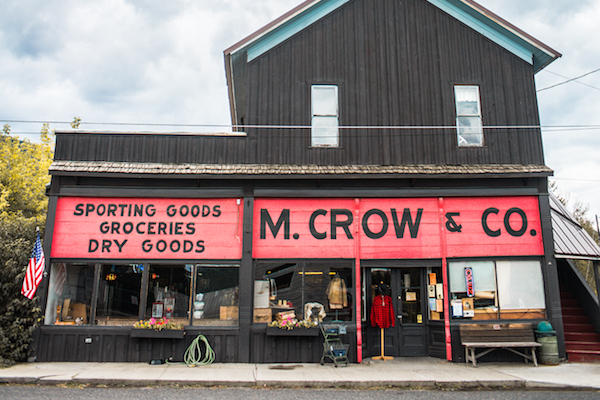written by Anna Bird | photos by Tim LaBarge
Amidst an overflow of boxes and shipping materials crowding the Bee Local and Jacobsen Salt Co. retail space, Damian Magista didn’t appear rushed or scattered. Magista, the founder of Bee Local, carried a humble and genuine excitement about his brand of micro-batch artisan honey. When the bees swarmed, his voice softened and his movements slowed.
In 2011, Magista started Bee Local, a craft honey company in Portland, after tasting the honey from a hive in his backyard. “I was blown away by the flavors,” Magista said. “Honey isn’t just honey. When you start thinking of it like wine or chocolate or coffee, they all have their own dynamic. It’s just because it has been commoditized that we stopped thinking about it in that way.”
The Bee Local philosophy is simple: always raw, never blended and gently filtered. Each honey is from one location, so it is truly a product of its environment. The Creston-Kenilworth honey from 39th Avenue and Powell in Portland has a slight citrusy flavor from kiwi vines above the hives; Williams Canyon is sweeter, with hints of blackberry, scotch broom and other wildflowers; Amity Hills has a toasted marshmallow flavor from fields of meadowfoam around the hives; and the Willamette Valley varietal tastes like classic honey.
This homespun business started with one hive in Magista’s backyard and grew to twenty hives around Portland. He maintained all the hives, doing the extractions and jarring gallons of honey in his kitchen until he gained a few team members and a small space. In 2015, Magista joined forces with Ben Jacobsen of Jacobsen Salt Co. to form the ultimate sweet-salty collaboration. Both companies shared a mission of changing the status quo for staple ingredients, and now they are able to extend their influence and distribution.
Bee Local now has 120 apiaries around the Northwest, including five hives on Portland rooftops. Nearly 400 restaurant partners throughout the country and 175 restaurants in Oregon use Bee Local for all of their honey needs. The company also started a dinner series, called Salt Water Fire, which pairs local chefs with other chefs from around the country to create a dinner incorporating their honey and salt. The first Salt Water Fire this year will partner a popular Nashville chef with Gabriel Rucker from Le Pigeon to make a “high-brow-meets-low-brow” barbecue feast.
To that end, Bee Local has come out with smoked honey, a hot honey sauce and, most recently, a smoked honey sauce—cold smoked with White Oak, infused with lapsang souchong and finished with a touch of apple cider vinegar—that are perfect for finger-licking barbecue.
Earlier this year, Bee Local won the Good Food Award for its Sauvie Island honey. From a purely culinary standpoint, this is good business. But beyond the flavor, Magista believes that responsible beekeeping (not shipping bees around and pumping them full of chemicals) can combat colony collapse disorder, the syndrome behind the honey bee crisis. “If we want to continue to feed our population, then we’re going to have to look at these different models,” Magista said.
Standing on the roof of Renata, a neighboring restaurant partner, Magista watched the bees, gently handled the hive and admired the small creatures and their process. He pulled out a screen, stuck his finger into the comb and tasted the fresh honey.
“They teach you to move slowly,” he said. “You learn how to read them and understand what they’re going to do, and I think that’s really what pulled me in. If you don’t want to get stung, you just need to slow down a little bit.”









